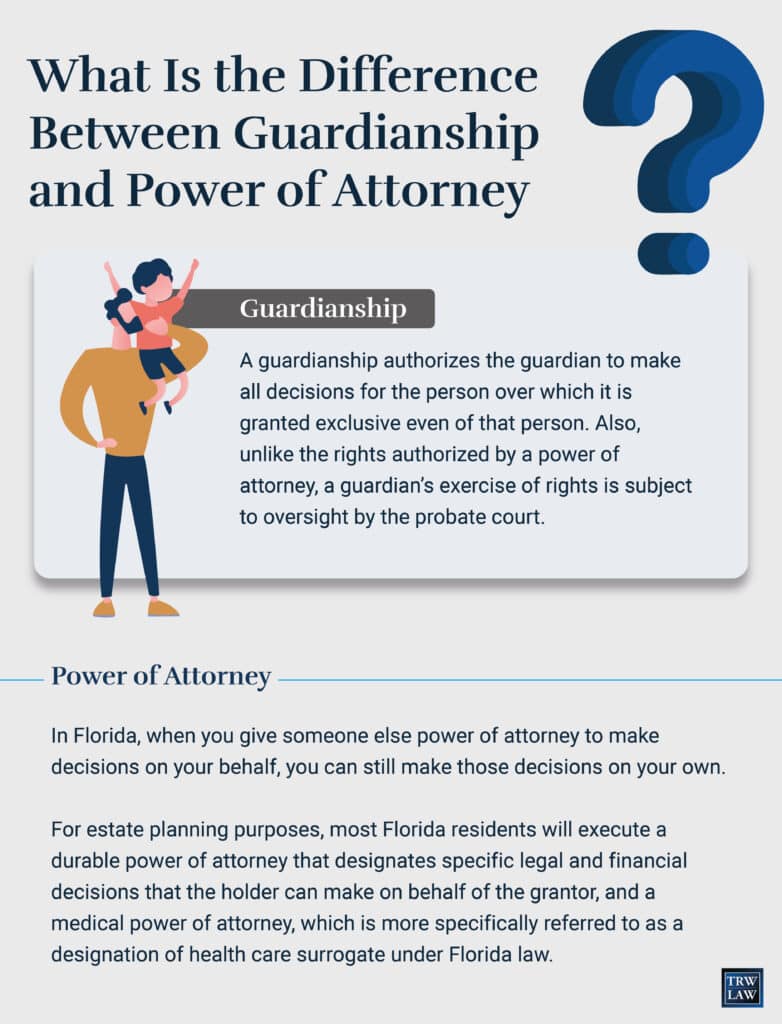In Florida, when you give someone else power of attorney to make decisions on your behalf, you can still make those decisions on your own. On the other hand, a Florida probate court will appoint guardianship authority to someone else when a person is incapacitated or is otherwise not capable of making financial or health care decisions.
Florida residents can contact the Law Offices of Travis R. Walker to speak directly with a guardianship attorney in Stuart, FL, about how powers of attorney and guardianships fit into comprehensive estate plans. Those plans involve far more than just designating who will receive your assets after you pass away. Specifically, a good estate plan will include a power of attorney that has clear and concise directions about how your health care and financial affairs are to be managed while you are alive and, if a guardianship becomes necessary, what authority the guardian will have to make decisions about your medical care and finances.
What authority is granted by a Power of Attorney?
For estate planning purposes, most Florida residents will execute a durable power of attorney that designates specific legal and financial decisions that the holder can make on behalf of the grantor, and a medical power of attorney, which is more specifically referred to as a designation of health care surrogate under Florida law.
The authority of a person holding a durable power of attorney in Florida will not terminate if the grantor becomes incapacitated after executing it. In all cases, a power of attorney document must include specific language that describes what the holder has a right to do.
How does Guardianship differ from a Power of Attorney?
Unlike a power of attorney, where the grantor retains authority to make decisions on his or her own behalf, a guardianship authorizes the guardian to make all decisions for the person over which it is granted exclusive even of that person. Also, unlike the rights authorized by a power of attorney, a guardian’s exercise of rights is subject to oversight by the probate court.

Will you need to file a petition for a Guardianship if you hold a valid Power of Attorney?
Unfortunately, sometimes when a person reaches extreme old age, they may lose the ability to care for themselves and their property but not realize or appreciate the dangers they poses to themselves and others. Your power of attorney for that person will NOT enable you to prevent them from:c
- Driving
- Spending or giving money away frivolously
- Granting powers of attorney to other individuals that want to exploit them
- Revoking the power of attorney that they gave to you
In these and a few other situations, you may need to file a petition for guardianship over that person. The probate court will then consider the evidence at a hearing and determine if a guardianship is in that person’s best interests.
Contact the Law Offices of Travis R. Walker for Legal Services Regarding Power of Attorney or Guardianship
You and your loved ones will save time, money, and frustration when you take care of issues involving durable and medical powers of attorney before an elderly person becomes so incapacitated that a guardianship proceeding is required. For more details about the differences between powers of attorney and guardianships, and for comprehensive estate planning assistance, call the Law Offices of Travis R. Walker. We can help establish a durable power of attorney and designate a health care surrogate that can best protect your loved ones and their assets.
We represent clients in Stuart, West Palm Beach, and throughout Martin and Palm Beach Counties and the Treasure Coast. Contact any of our offices for professional and personal estate planning representation.













